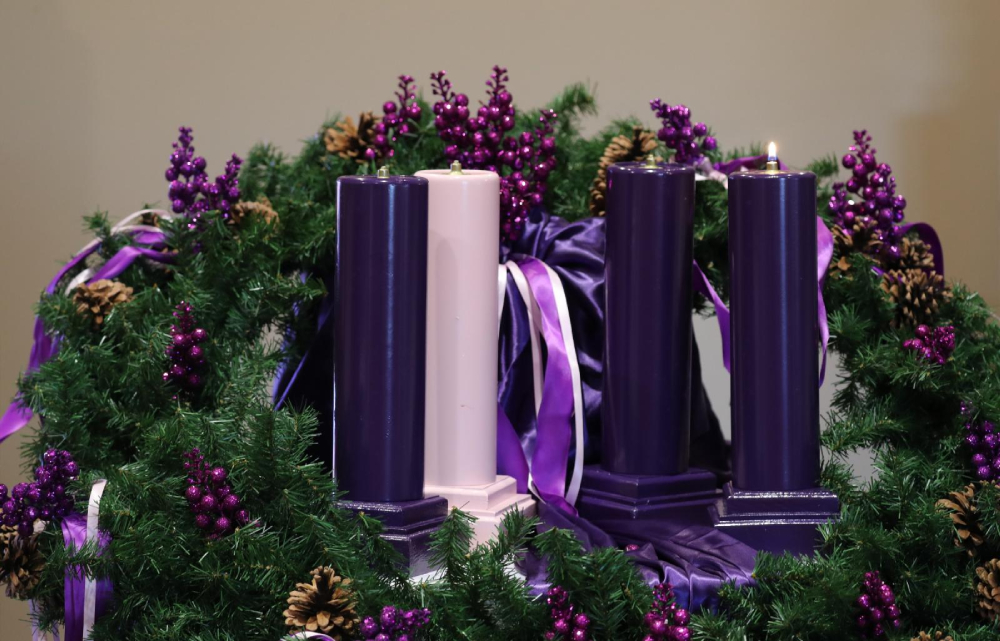
One purple candle is lit on an Advent wreath, the central symbolic rite of spiritual preparation for Christmas. Purple is the color of penitence and humility. The rose colored candle, lit the Third Week of Advent, represents a hopeful look toward Christ's coming. (OSV News/Bob Roller)
This last day of November ends another calendar month and moves us closer to December 21, the winter solstice and the shortest day of the year, when we will be plunged into deeper darkness. Meanwhile, the liturgical season of Advent begins. These next few weeks will find us waiting for the dawn of a new day, embodied in the arrival of the Christ Child whose birth is supposed to usher in a time of peace, one that is forever on the horizon but yet to be realized.
Advent is a time of waiting. But what are we waiting for? Surely the Second Coming will not arrive on December 25, 2025 — or will it?
Reflecting on our present time, we cannot help but be shaken to our core at how immigrants are being treated by other human beings, outfitted in military gear and face coverings. Under the guise of keeping the peace these agents instead instill fear in those on the margins who have little or no power to resist. Elsewhere, artificial intelligence data centers are being built with rapid speed, changing the course of how and what we think, how we live our lives and how we will relate— or not relate — to one another in the future. Already, communities in high tech regions are experiencing AI’s drain on water supplies, especially in areas receiving less rainfall because of climate change. And political, social, economic, cultural and religious wars rage on.
Yet even in times such as these, hope dawns; we move from Ordinary Time to the season of Advent with a prophetic vision lighting our path.
People in biblical times experienced similar traumas, upheavals, tragedies and devastations. And yet, they were never without a word of hope. Today’s first reading from the book of Isaiah captures the spirit of anticipation and hope.
The poem opens on a futuristic note, "in days to come." The prophetic vision of peace and unity remains a vision, but one that we can hope for and work toward. The vision anticipates a time when nations will come together, focused on a common journey, ready to receive instruction from the One who sets the tone for relationships among the nations. The Holy One does not act like a judge and does not condemn any of the nations; rather, the Holy One arbitrates among them. When the negotiation takes place, the people can beat their swords into plowshares and their spears into pruning hooks, never again to take up the weapons of war against each other or to learn war. The way to peace is not through violence and bloodshed; rather, it is through instruction and arbitration, initiated, in this poem, by God.
We who are baptized into the Catholic faith are baptized into the prophetic; it is our vocation and our calling. We are the recipients of this marvelous vision in these tumultuous times of global crises. The vision calls us to remain faithful to a non-violent way of life, no matter how polarized our world is and will continue to become. The vision provides us with the impetus for hope: hope that one day all communities of life will live in peace, the fruit of justice.
Advertisement
But this vision also reminds us that we are not just the recipients of this vision, but the ones who work to make this vision a lived experience. Each of us is imbued with the prophetic spirit of the divine. Each of us has the potential and capacity to exercise our prophetic vocation and calling, and in doing so, to enflesh the presence of the divine in the here and now. The more we embody the Holy One — the one who negotiates and arbitrates among all peoples and across all cultures and nations — the more we offer hope to our world that is anticipating the advent of a new time.
Business cannot continue as usual. The letter to the Romans is a clarion call to people everywhere, not just to the early Christian communities. Now is the time for all of us to get our acts together, to look outward instead of focusing on what is continuously self-satisfying. The reading calls for a higher ethic, one based on the Gospel capable of transforming all the sordidness of life.
Would that people in leadership heed this clarion call and work to bring about the vision of peace that has justice as its foundation. What are we all waiting for?
